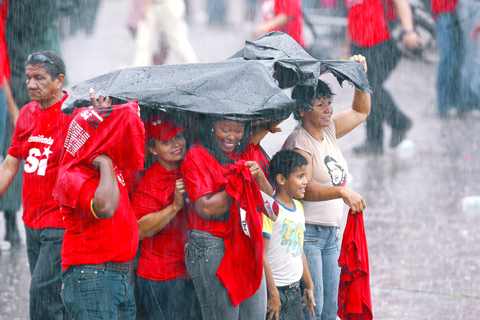Venezuelan President Hugo Chavez on Monday boasted that his socialist revolution was on track as he celebrated 10 years in office before a group of Latin American leaders.
This past decade can be summed up “in three words: revolution, independence and socialism,” the fiercely anti-US president said beneath the statue of Venezuela’s forefather Simon Bolivar, a replica of whose sword he received to honor the occasion.
“This sword saw Bolivar die and we could say it died with him ... nobody saw it ever again,” Chavez, 54, said in a speech, two weeks before a referendum that could keep him in power for a long time.

PHOTO: AP
“Ten years ago, on a day like today, the sword reappeared after nearly 200 years. Ten years ago, Bolivar became the people and returned with his liberating sword,” he said in an obvious reference to when he was first sworn in 1999.
Thousands of people lining one of Caracas’ main avenues cheered as Chavez waved from an open-top car when he made his way to the Bolivar monument accompanied by presidents Evo Morales of Bolivia, Daniel Ortega of Nicaragua and Manuel Zelaya of Honduras.
To celebrate his milestone in power, Chavez declared a national holiday on Monday. Also present to celebrate Chavez’s 10th anniversary were Cuban Vice President Jose Ramon Machado and Dominica Prime Minister Roosevelt Skerrit.
The leaders later held a meeting in the framework of the Bolivarian Alternative initiative, which Chavez and Cuba created in 2004 to promote a Latin American free trade zone as a counterweight to US trade efforts in the region.
Monday’s celebration came less than two weeks before the Feb. 15 referendum on a constitutional amendment already approved by Congress that would do away with term limits for the president and all other elected officials in Venezuela.
If the text is approved, the firercely anti-liberal president, who has more than 57 percent approval ratings, could stand for re-election in 2012.
Chavez muscled through a 1999 constitutional amendment that removed the one-term limit to the presidency, leading to his 2006 reelection for a second, five-year term.

The latest batch from convicted sex offender Jeffrey Epstein’s e-mails illustrates the extraordinary scope of his contacts with powerful people, ranging from a top Trump adviser to Britain’s ex-prince Andrew. The US House of Representatives is expected to vote this week on trying to force release of evidence gathered on Epstein by law enforcement over the years — including the identities of the men suspected of participating in his alleged sex trafficking ring. However, a slew of e-mails released this week have already opened new windows to the extent of Epstein’s network. These include multiple references to US President Donald

CHARGES: The former president, who maintains his innocence, was sentenced to 27 years and three months in prison for a failed coup bid, as well as an assassination plot Far-right former Brazilian president Jair Bolsonaro is running out of options to avoid prison, after judges on Friday rejected his appeal against a 27-year sentence for a botched coup bid. Bolsonaro lost the 2022 elections and was convicted in September for his efforts to prevent Brazlian President Luiz Inacio Lula da Silva from taking power after the polls. Prosecutors said the scheme — which included plans to assassinate Lula and a top Brazilian Supreme Court judge — failed only due to a lack of support from military top brass. A panel of Supreme Court judges weighing Bolsonaro’s appeal all voted to uphold

Chinese tech giant Alibaba yesterday denied it helps Beijing target the US, saying that a recent news report was “completely false.” The Financial Times yesterday reported that Alibaba “provides tech support for Chinese military ‘operations’ against [US] targets,” a White House memo provided to the newspaper showed. Alibaba hands customer data, including “IP addresses, WiFi information and payment records,” to Chinese authorities and the Chinese People’s Liberation Army, the report cited the memo as saying. The Financial Times said it could not independently verify the claims, adding that the White House believes the actions threaten US security. An Alibaba Group spokesperson said “the assertions

LEFT AND RIGHT: Battling anti-incumbent, anticommunist sentiment, Jeanette Jara had a precarious lead over far-right Jose Antonio Kast as they look to the Dec. 14 run Leftist candidate Jeannette Jara and far-right leader Jose Antonio Kast are to go head-to-head in Chile’s presidential runoff after topping Sunday’s first round of voting in an election dominated by fears of violent crime. With 99 percent of the results counted, Jara, a 51-year-old communist running on behalf of an eight-party coalition, won 26.85 percent, compared with 23.93 percent for Kast, the Servel electoral service said. The election was dominated by deep concern over a surge in murders, kidnappings and extortion widely blamed on foreign crime gangs. Kast, 59, has vowed to build walls, fences and trenches along Chile’s border with Bolivia to